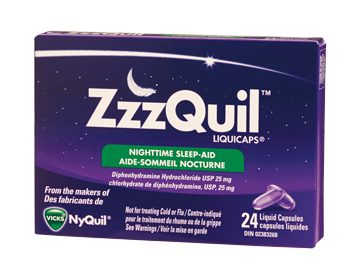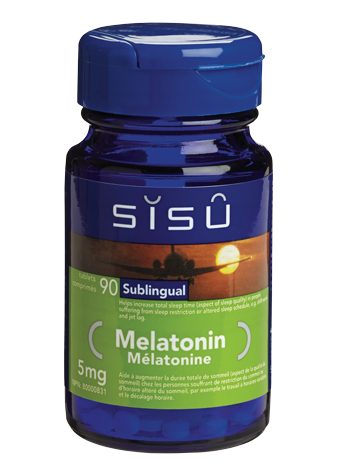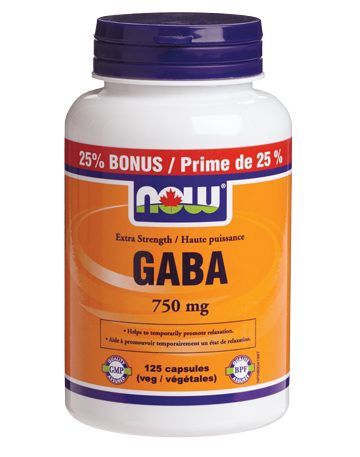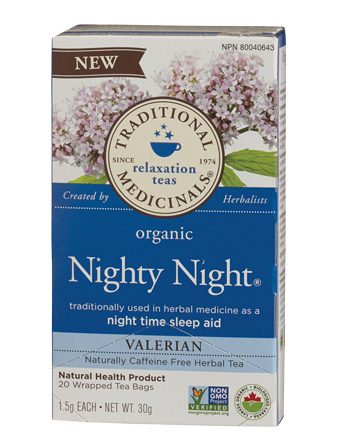
Diphenhydramine
Examples: ZzzQuil LiquiCaps; Advil Nighttime; Insomnal; Sleep-Eze D Extra Strength; Tylenol Nighttime
How they work: Diphenhydramine, the key ingredient in these products, is an antihistamine that is commonly used to treat allergy symptoms. While histamines are not involved in keeping you awake, one of diphenhydramine’s side effects is drowsiness, so it is also sold as a sleeping agent, says Mehr. Taken just before bedtime, it can help you feel tired enough to fall asleep. For people who are unable to get to sleep because of pain, diphenhydramine is also available in combination with pain relievers ibuprofen (Advil) or acetaminophen (Tylenol). “Or you could take the diphenhydramine and painkiller separately,” says Mehr.
Need to know: Follow package directions for appropriate dosage and timing (generally, these medications are taken 15 to 30 minutes before bedtime). Side effects may include daytime drowsiness the following day, dry mouth, headaches, dizziness and memory problems. Avoid drinking alcohol after taking these products, and don’t drive or perform tasks that require mental alertness. Talk to your doctor first if you are pregnant or breastfeeding, or if you have an existing health condition such as asthma, liver disease or glaucoma (as diphenhydramine may worsen these conditions). Tolerance to these medications can develop quickly, so don’t use these remedies for more than three nights at a time.

Melatonin remedies
Examples: Sisu Melatonin; Genuine Health Sleep+ Time Release; Jamieson Melatonin-3 Strips; Nature’s Harmony Sleep Tight Liquid Melatonin; Webber Naturals Melatonin Tablets
How they work: “Melatonin is a natural hormone produced by the brain that helps regulate the circadian rhythms of the body,” says Knee. “It’s very low in the daytime but it rises in the evenings, producing the sedative, calming effects that signal us to sleep.” If you have trouble staying asleep, or if you do shift work or travel across time zones regularly, you could have a melatonin deficiency. Although studies on the effectiveness of melatonin supplementation have been inconclusive, it may help you fall asleep as well as enhance your quality of sleep. However, if you don’t get results after two or three doses, it’s probably not the right remedy for you, says Mehr.
Need to know: Follow package directions for appropriate dosage and timing (the liquid formulas will take effect faster than tablets). Although melatonin is not habit-forming, the side effects may include daytime sleepiness the following day, dizziness and headaches; less commonly, some people experience abdominal discomfort, irritability and short-lasting feelings of depression. Avoid drinking alcohol after taking these products, and don’t drive or perform tasks that require mental alertness. Talk to your doctor before taking them if you are pregnant or breastfeeding.

Supplements
Examples: Now Foods GABA Capsules; Jamieson Stress Support; Natural Factors Tranquil Sleep; Orange Naturals Magnesium Glycinate; Organika L-Theanine
How they work: L-theanine (found in Natural Factors and Organika) is an amino acid commonly derived from green tea that can help people fall asleep because of its calming effect on the mind, says Knee. Today, it is mostly produced synthetically. GABA (gamma aminobutyric acid, found in Now Foods) is an inhibitory neurotransmitter; some brands, such as Jamieson, which is taken during the day (there is also a nighttime version of this product), combine GABA and L-theanine. “If you are deficient in magnesium, supplementing it can work extremely well to help you sleep, as it relaxes the muscles in the body,” says Mehr. He adds that magnesium glycinate (found in Orange Naturals) seems to be more effective than other types of magnesium.
Need to know: Follow package directions for appropriate dosage. Avoid drinking alcohol after taking these products, and don’t drive or perform tasks that require mental alertness. These remedies are considered safe, but talk to your doctor first if you are pregnant or if you are breastfeeding. And if you are taking other medications, L-theanine may alter their effects.

Herbal remedies
Examples: Traditional Medicinals Nighty Night Valerian; Counting Sheep Coffee 40 Winks; Jamieson Relax & Sleep; Now Foods Valerian Root; Orange Naturals Chamomile Tincture; Organika Bed Time; St. Francis ValeriCalm; Swiss Natural Sources Herbal Sleep Well Tablets
How they work: Valerian is a calming herb that can be taken as a tea (Traditional Medicinals), in decaffeinated coffee (Counting Sheep), a liquid tincture (St. Francis) or oral capsules (Now Foods). Often, it is found in combination with herbs such as catnip, hops and passionflower (Jamieson, Swiss Natural Sources and Organika). “All of these herbs have a calming effect, and act in the brain to slow nerve impulses and lessen anxiety, helping you relax and fall asleep,” says Knee. Chamomile (found in Orange Naturals) has a similar but gentler effect, and can also help to ease digestive discomfort.
Need to know: Follow the package directions for appropriate dosage. Though considered safe, in extremely large doses valerian, catnip and hops may cause headaches, dizziness, nausea and sleeplessness. Avoid drinking alcohol after taking valerian, catnip or hops, and don’t drive or perform tasks requiring mental alertness. If you are pregnant or breastfeeding, you should talk to your doctor first. If you are taking other medications, they may interact with valerian.
